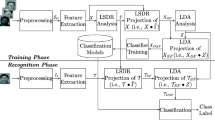Abstract
All the traditional PCA-based and LDA-based methods are based on the analysis of vectors. So, it is difficult to evaluate the covariance matrices in such a high-dimensional vector space. Recently, two-dimensional PCA (2DPCA) and two-dimensional LDA (2DLDA) have been proposed in which image covariance matrices can be constructed directly using original image matrices. In contrast to the covariance matrices of traditional 1D approaches (PCA and LDA), the size of the image covariance matrices using 2D approaches (2DPCA and 2DLDA) are much smaller. As a result, it is easier to evaluate the covariance matrices accurately and computation cost is reduced. However, a drawback of 2D approaches is that it needs more coefficients than traditional approaches for image representation. Thus, 2D approach needs more memory to store its features and costs more time to calculate distance (similarity) in classification phase. In this paper, we develop a new image feature extraction methods called two-stage 2D subspace approaches to overcome the disadvantage of 2DPCA and 2DLDA. The initial idea of two-stage 2D subspace approaches which consist of two-stage 2DPCA and two-stage 2DLDA is to perform 2DPCA or 2DLDA twice: the first one is in horizontal direction and the second is in vertical direction. After the two sequential 2D transforms, the discriminant information is compacted into the up-left corner of the image. Experiment results show our methods achieve better performance in comparison with the other approaches with the lower computation cost.
This research was supported by the MIC (Ministry of Information and Communication), Korea, under the ITRC(Information Technology Research Center) support program supervised by the IITA (Institute of Information Technology Assessment).
Preview
Unable to display preview. Download preview PDF.
Similar content being viewed by others
References
Turk, M., Pentland, A.: Eigenfaces for face recognition. Int. J. Cog. Neurosci. 3, 71–86 (1991)
Zhao, W., Chellappa, R., Phillips, P.J.: Subspace Linear Discriminant Analysis for Face Recognition. Technical Report CAR-TR-914, Center for Automation Research, University of Maryland (1999)
Swets, D.L., Weng, J.J.: Using discrimination eigenfeatures for image retrieval. IEEE Trans. Pattern Anal. Machine Intell. 18, 831–836 (1996)
Belhumeur, P.N., Hespanha, J.P., Kriegman, D.J.: Eigenfaces vs. fisherface: Recognition using class specific linear projection. IEEE Trans. Pattern Anal. Machine Intell. 19, 711–720 (1997)
Yu, H., Yang, J.: A direct LDA algorithm for high-dimensional data with application to face recognition. Pattern Recognit. 34, 2067–2070 (2001)
Loog, M., Duin, R.P.W., Haeb-Umbach, R.: Multiclass linear dimension reduction by weighted pairwise fisher criteria. IEEE Trans. Pattern Anal. Machine Intell. 23, 762–766 (2001)
Martinez, A.M., Kak, A.C.: PCA versus LDA. IEEE Trans. Pattern Anal. Machine Intell. 23, 228–233 (2001)
Foley, D.H., Sammon, J.W.: An optimal set of discrimination vectors. IEEE Trans. Comput. C-24, 281–289 (1975)
Fisher, R.A.: The use of multiple measurements in taxonomic problems. Ann. Eugenics 7, 178–188 (1936)
Huang, R., Liu, Q., Lu, H., Ma, S.: Solving the small sample size problem of LDA. Pattern Recognition. In: Proceedings. 16th International Conference on, vol. 3, pp. 29–32 (2002)
Liu, C., Wechsler, H.: Robust coding scheme for indexing and retrieval from large face databases. IEEE Trans. Image Processing 9, 132–137 (2000)
Liu, C., Wechsler, H.: A shape- and texture-based enhanced Fisher classifier for face recognition. IEEE Trans. Image Processing 10, 598–608 (2001)
Chen, L., Liao, H.M., Ko, M., Lin, J., Yu, G.: A new LDA-based face recognition system which can solve the small sample size problem. Pattern Recognit. 33, 1713–1726 (2000)
Cevikalp, H., Neamtu, M., Wilkes, M., Barkana, A.: Discriminative common vectors for face recognition. IEEE Transactions on Pattern Analysis and Machine Intelligence 27, 4–13 (2005)
Yang, J., Zhang, D., Frangi, A.F., Yang, J.-y.: Two-dimensional PCA: a new approach to appearance-based face representation and recognition. IEEE Transactions on Pattern Analysis and Machine Intelligence 26, 131–137 (2004)
Li, M., Yuan, B.: 2D-LDA: A statistical linear discriminant analysis for image matrix. Pattern Recognition Letters 26(5), 527–532 (2005)
The ORL face database, http://www.uk.research.att.com/facedatabase.html
Author information
Authors and Affiliations
Editor information
Editors and Affiliations
Rights and permissions
Copyright information
© 2005 Springer-Verlag Berlin Heidelberg
About this paper
Cite this paper
Nhat, V.D.M., Lee, S. (2005). New Feature Extraction Approaches for Face Recognition. In: Zhang, S., Jarvis, R. (eds) AI 2005: Advances in Artificial Intelligence. AI 2005. Lecture Notes in Computer Science(), vol 3809. Springer, Berlin, Heidelberg. https://doi.org/10.1007/11589990_51
Download citation
DOI: https://doi.org/10.1007/11589990_51
Publisher Name: Springer, Berlin, Heidelberg
Print ISBN: 978-3-540-30462-3
Online ISBN: 978-3-540-31652-7
eBook Packages: Computer ScienceComputer Science (R0)




